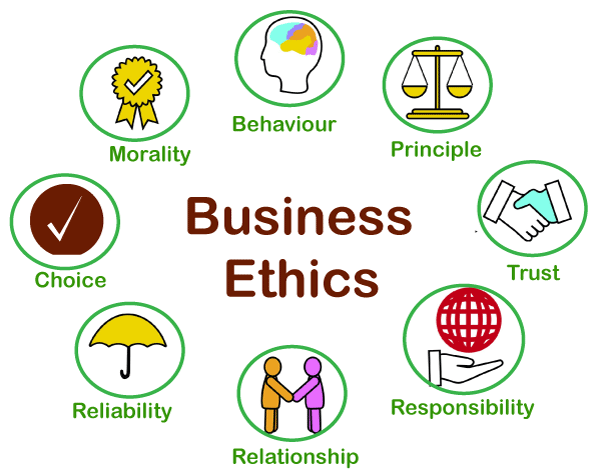Advantages and Disadvantages of Business EthicsWhat are Ethics Means?Ethics is a branch of philosophy that deals with understanding the moral principles that guide human behavior. It is the study of right and wrong and involves questions of fairness, justice, and responsibility. Ethical decisions are based on moral values and principles that help determine right and wrong. 
At its core, ethics is the study of how people should live and interact with each other. It focuses on issues of fairness, justice, and respect for others. It examines how a society should be organized, how laws should be established, and how people should behave. It also looks at the consequences of certain actions and how to make moral judgments about them. Ethics is a way of thinking that encourages people to consider the impact of their actions on others and to act in a way that is good for the greater good. It helps us to determine what is right and wrong and to make decisions that are based on moral values. Ethics is also about making sure that everyone is treated fairly. It is about understanding and respecting the rights of others and not taking advantage of them. It seeks to ensure everyone has the same opportunities and is treated with respect and dignity. Ethics is also about creating a society where people can live in harmony with one another. It is about establishing rules and regulations that promote fairness and justice and allow everyone to live with dignity and respect. Finally, ethics is about understanding the consequences of our actions and ensuring that our decisions align with our values. It is about recognizing that our actions can have a long-term impact on people and the environment and that we should strive to ensure that all decisions are ethical. In short, ethics is a way of thinking and a set of principles that guide our decisions and behavior to ensure that we act in a good way for the greater good. It is about understanding the impact of our actions and making sure that we act in a way that is fair and just. What is Business Ethics?Business Ethics is defined as the ethical principles that guide the decisions and conduct of individuals and organizations. It is a set of standards for businesses to follow when dealing with their customers, employees, partners, and other stakeholders. Business ethics are based on the belief that businesses should act responsibly and respect the rights and interests of those affected by their decisions. Business ethics can be divided into two categories: Corporate Ethics and Individual Ethics. Corporate ethics refers to the values and principles that guide business operations. This can include a company's commitment to honesty and integrity, as well as its commitment to environmental protection and social responsibility. Corporate ethics also involve establishing policies and procedures to ensure that employees and other stakeholders maintain appropriate behavior in the workplace. These policies and procedures should be based on ethical principles, such as fairness, respect, and responsibility. Individual ethics refers to the personal values and choices individuals make in their professional and personal lives. This includes decisions about how to handle situations, how to treat others, and how to act when faced with ethical dilemmas. Individuals must also consider how their decisions affect their colleagues, partners, customers, and other stakeholders. Business ethics is important because it helps maintain a good reputation for businesses and encourages ethical decision-making throughout the organization. Good business ethics can also help businesses gain a competitive advantage by improving customer relationships and creating a positive work environment. Furthermore, businesses that practice ethical business practices will often experience increased profitability and efficiency. Business ethics is important not only for businesses but also for society as a whole. Ethical businesses contribute to the overall health and welfare of the communities in which they operate. Ethical businesses are more likely to pay taxes and provide quality goods and services. Additionally, ethical businesses are more likely to respect the rights of employees and adhere to labor laws. In conclusion, business ethics is an important part of any organization. It ensures that businesses are acting responsibly and with respect for their customers, employees, partners, and other stakeholders. It is also important for society as a whole, as ethical businesses contribute to the overall health and welfare of the communities in which they operate. Why are Business Ethics Important?Business ethics is the application of ethical principles, values, and practices to decisions, policies, and procedures within a business organization. It is important to recognize that business ethics is a broad term encompassing many different concepts. Business ethics is important because it sets the tone for how a company behaves and is perceived. It affects how customers view the company, how employees interact with each other, and how the public views the company. Business ethics also impacts the company's ability to attract and retain talent and its financial performance. 
Business ethics is important because it helps to ensure that a company's operations are conducted in a way that is responsible and compliant with the law. Businesses that adhere to ethical standards and practices demonstrate that they are responsible and trustworthy. This can be important to customers when deciding which company to do business with. Good business ethics can also help a company to build and maintain a good reputation. Companies with a good reputation are more likely to succeed in the long term. Companies perceived as ethical and responsible are more likely to attract customers, investors, and other stakeholders. Business ethics is also important because it can help to protect the company from legal issues. Companies that adhere to ethical standards and practices demonstrate that they are responsible and trustworthy, which can help to reduce the risk of legal action being taken against them. Businesses need to be aware of the laws and regulations that apply to their operations, as well as any ethical considerations that may be relevant. Business ethics is also important because it can help to create a safe and healthy work environment. Companies that adhere to ethical standards and practices are more likely to treat their employees fairly, respect their rights, and provide a safe and healthy work environment. This can help reduce the risk of accidents and other workplace incidents and ensure that employees are treated respectfully. Advantages of Business EthicsAs we know, Business ethics refers to the principles and standards that guide the decisions and actions of businesses and their employees. Business ethics are essential for the successful functioning of an organization. They promote fairness and honesty in the business environment, ensure that all stakeholders have an equal opportunity to benefit from the company's activities, and foster a positive image of the company in the public eye. 1. Creates a Sense of Trust and Loyalty The primary advantage of business ethics is that it creates a sense of trust and loyalty among customers, suppliers, and other stakeholders. Customers will be more likely to trust a business if they know it operates ethically and that its interests are taken into consideration. Suppliers will be more likely to do business with a company that is considered ethical. This trust can lead to better relationships with customers and suppliers and more profitable business relationships. 2. Respect Within the Organization Business ethics also help foster a culture of fairness and respect within the organization. Employees are more likely to be motivated and productive when they know their employer is committed to ethical practices. The ethical environment created by business ethics can also help prevent unethical behavior such as bribery, embezzlement, and fraud. 3. Promote Social Responsibility Business ethics can also help to protect the environment and promote social responsibility. Companies that adhere to ethical business practices are more likely to consider the environmental impact of their actions and take steps to ensure that their activities are sustainable. Additionally, by promoting ethical business practices, companies can help to reduce their carbon footprint and contribute to a healthier environment. 4. Improve the Public Image of a Company Furthermore, business ethics can help improve a company's public image. Customers are more likely to purchase products or services from a company that is considered ethical and responsible. Additionally, ethical practices can help attract and retain talented employees, who will be more likely to stay with a company they know to be ethical. 5. Increase Employee Morale Business ethics help to ensure that employees respect each other and the rules in the workplace. This creates a better working environment and increases employee morale. 6. Improve the Financial Performance of a Company Finally, business ethics can help improve a company's financial performance. Companies that adhere to ethical business practices are more likely to be financially successful, as customers and suppliers will be more likely to do business with them. Additionally, ethical practices can help attract investors, as they will be more likely to invest in a company that is considered responsible and trustworthy. 7. Improve Bottom Line Business ethics help to ensure that customers are treated fairly and that employees adhere to the company's core values. This helps to increase customer loyalty and, in turn, improves the company's bottom line. In conclusion, business ethics are essential for the successful functioning of an organization. They create a sense of trust and loyalty among customers and suppliers, foster a culture of fairness and respect within the organization, protect the environment and promote social responsibility, improve the company's public image, and improve its financial performance. By implementing ethical business practices, companies can ensure their long-term success and contribute to a healthier and more sustainable society. Disadvantages of Business EthicsBusiness ethics is an important part of any business, as it provides a framework for how the company should act to be successful and remain competitive. It also reflects the values and principles of the business and can help to attract and retain employees, customers, and other stakeholders. However, there are also some potential disadvantages to having a strong focus on business ethics.
Ultimately, business ethics is an important part of any business and can help to create a positive and ethical culture. However, companies need to be aware of the potential disadvantages of having a strong focus on business ethics and ensure that their ethical standards are practical and meaningful. ConclusionFinally, business ethics is important because it can help to promote innovation and creativity. Companies with ethical standards and practices are more likely to create an environment where employees feel comfortable expressing their ideas and contributing towards developing new products and services. This can help to keep the company competitive in the marketplace. In conclusion, business ethics is an important concept for any company. It can ensure that a company operates responsibly, attract customers, protect it from legal issues, create a safe and healthy work environment, and promote innovation and creativity. Adopting and adhering to ethical standards and practices is an important step for any company. |
 For Videos Join Our Youtube Channel: Join Now
For Videos Join Our Youtube Channel: Join Now
Feedback
- Send your Feedback to [email protected]
Help Others, Please Share









